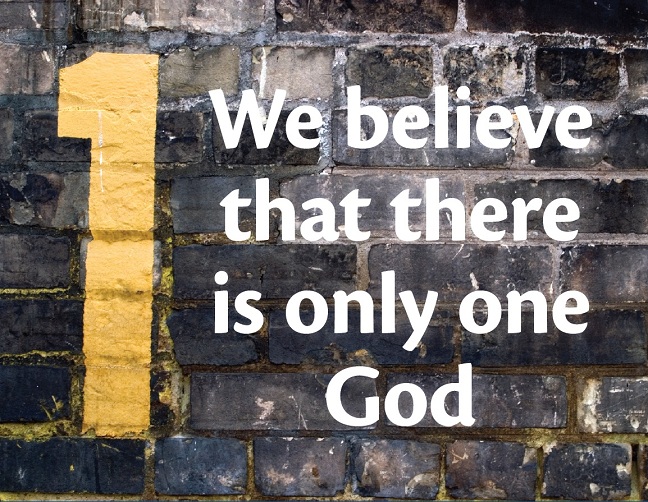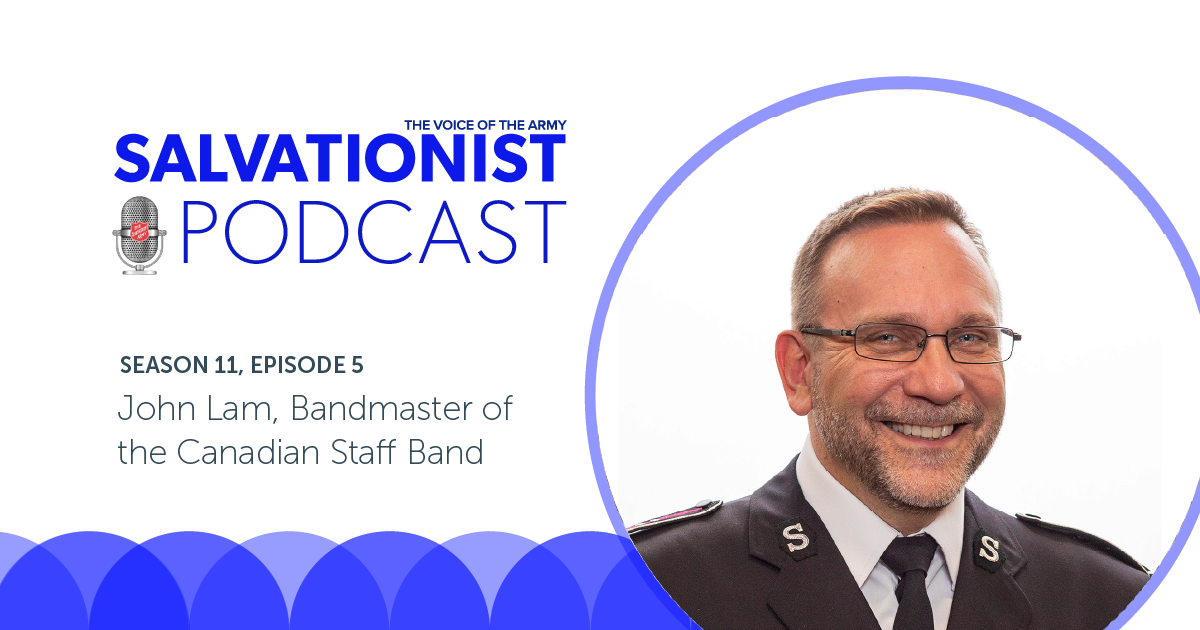Who or what is God? A delusion? A source of terror? Irrelevant? To speak of God in the 21st century seems out of place to many. Yet The Salvation Army's doctrines take that risk. Convinced that God has disclosed himself most fully in the life, death and Resurrection of Jesus of Nazareth, Salvationists join the broader church in naming God as Trinity: Father, Son and Holy Spirit. Foundational to that belief, however, is the affirmation of God's oneness: We believe that there is only one God, who is infinitely perfect, the Creator, Preserver, and Governor of all things, and who is the only proper object of religious worship (Doctrine 2).
At the heart of biblical faith lies the conviction: “Hear, O Israel: the Lord our God, the Lord is one” (Deuteronomy 6:4). This fundamental understanding is also sustained in the New Testament. When Jesus was asked which of the commandments was most important, he responded, “Hear, O Israel: the Lord our God, the Lord is one. Love the Lord your God with all your heart and with all your soul and with all your mind and with all your strength” (Mark 12:29-30). In his commentary, Deuteronomy, Patrick Miller reflects: “To confess, therefore, that the Lord is 'one' is to claim that [God] … is faithful, consistent, not divided within mind, heart or self in any way…. In purpose and being, God is one.” In other words, to speak of God as “one” has everything to do with God's character. God is a God of integrity.
One implication of this doctrine is that we can trust the integrity of both science and the Bible. We live in an incredible universe. The Canadian astronaut, Chris Hadfield, gave the world a glimpse of its remarkable beauty in a recent journey into space. It's a huge universe, stretching out 13.7 billion light years in distance. It's also a remarkably small universe, in that 500 trillion protons can fit on the dot of this “i” without having to go on a diet! I don't pretend to comprehend all the scientific explanations of our universe, but I can trust the integrity of their findings. Neither do I need to view them in competition with the biblical writers. The Bible concerns itself with God's relation to this majestic universe, not how it came to be. Genesis says simply, “It is good!” (see Genesis 1). As part of this good creation, God brings a creature into existence with freedom to be other than God. That's where the Bible's real interest lies.
God's faithful, consistent integrity impacts not just the way we view science. It also impacts the way we live out our understanding of holiness. The Salvation Army's eighth General, Frederick Coutts, captured the importance of this doctrine when he wrote: “A person's conception of holiness is governed by the character of God he [or she] worships.” Salvationists worship and serve a God of integrity. In contrast, author David Callahan argues that we live in a “cheating culture.” Faced with accountants that fudge their balance sheets, athletes who compete with performance-enhancing drugs and clergy who download sermons and pass them off as their own, Callahan notes we are “not only cheating more in many areas but are also feeling less guilty about it. When 'everybody does it,' or imagines that everybody does it, a cheating culture has emerged.” Salvationists are called to be a people of personal and corporate integrity in a culture where cheating is so often the rule of thumb.
The biblical story discloses God's faithful integrity. From his calling of Abraham and Sarah, to the formation of Israel to be a holy nation, to the prophetic critiques of Amos and Jeremiah, God spoke and acted with integrity. Jesus of Nazareth was also characterized by integrity. His compassion embraced both a grieving widow and a distraught leader of a synagogue. He challenged his own disciples' ambitions in private as well as defending them in public. And when his opponents sought to bring a false charge against him before governing authorities, they were handcuffed. Jesus lived a life of integrity before a watching world.
We, too, are called to be a people of integrity because God's character is marked by integrity. How we carry out our policies, preach our sermons, publicize our activities to the nation and spend our time has everything to do with character. We believe in one God, a God who is consistent and faithful. A God of integrity. This conviction matters!
Major Ray Harris is a retired Salvation Army officer in the Canada and Bermuda Territory. He and his wife, Cathie, have served across Canada in various congregational, college and administrative appointments. He lives in Winnipeg, where he enjoys baking rhubarb crumble.
Convictions Matter, Major Ray Harris' new book, is available at store.salvationarmy.ca, by telephone at 416-422-6100, or by e-mail to orderdesk@can.salvationarmy.org. For e-book, visit amazon.ca
At the heart of biblical faith lies the conviction: “Hear, O Israel: the Lord our God, the Lord is one” (Deuteronomy 6:4). This fundamental understanding is also sustained in the New Testament. When Jesus was asked which of the commandments was most important, he responded, “Hear, O Israel: the Lord our God, the Lord is one. Love the Lord your God with all your heart and with all your soul and with all your mind and with all your strength” (Mark 12:29-30). In his commentary, Deuteronomy, Patrick Miller reflects: “To confess, therefore, that the Lord is 'one' is to claim that [God] … is faithful, consistent, not divided within mind, heart or self in any way…. In purpose and being, God is one.” In other words, to speak of God as “one” has everything to do with God's character. God is a God of integrity.
One implication of this doctrine is that we can trust the integrity of both science and the Bible. We live in an incredible universe. The Canadian astronaut, Chris Hadfield, gave the world a glimpse of its remarkable beauty in a recent journey into space. It's a huge universe, stretching out 13.7 billion light years in distance. It's also a remarkably small universe, in that 500 trillion protons can fit on the dot of this “i” without having to go on a diet! I don't pretend to comprehend all the scientific explanations of our universe, but I can trust the integrity of their findings. Neither do I need to view them in competition with the biblical writers. The Bible concerns itself with God's relation to this majestic universe, not how it came to be. Genesis says simply, “It is good!” (see Genesis 1). As part of this good creation, God brings a creature into existence with freedom to be other than God. That's where the Bible's real interest lies.
God's faithful, consistent integrity impacts not just the way we view science. It also impacts the way we live out our understanding of holiness. The Salvation Army's eighth General, Frederick Coutts, captured the importance of this doctrine when he wrote: “A person's conception of holiness is governed by the character of God he [or she] worships.” Salvationists worship and serve a God of integrity. In contrast, author David Callahan argues that we live in a “cheating culture.” Faced with accountants that fudge their balance sheets, athletes who compete with performance-enhancing drugs and clergy who download sermons and pass them off as their own, Callahan notes we are “not only cheating more in many areas but are also feeling less guilty about it. When 'everybody does it,' or imagines that everybody does it, a cheating culture has emerged.” Salvationists are called to be a people of personal and corporate integrity in a culture where cheating is so often the rule of thumb.
The biblical story discloses God's faithful integrity. From his calling of Abraham and Sarah, to the formation of Israel to be a holy nation, to the prophetic critiques of Amos and Jeremiah, God spoke and acted with integrity. Jesus of Nazareth was also characterized by integrity. His compassion embraced both a grieving widow and a distraught leader of a synagogue. He challenged his own disciples' ambitions in private as well as defending them in public. And when his opponents sought to bring a false charge against him before governing authorities, they were handcuffed. Jesus lived a life of integrity before a watching world.
We, too, are called to be a people of integrity because God's character is marked by integrity. How we carry out our policies, preach our sermons, publicize our activities to the nation and spend our time has everything to do with character. We believe in one God, a God who is consistent and faithful. A God of integrity. This conviction matters!
Major Ray Harris is a retired Salvation Army officer in the Canada and Bermuda Territory. He and his wife, Cathie, have served across Canada in various congregational, college and administrative appointments. He lives in Winnipeg, where he enjoys baking rhubarb crumble.
Convictions Matter, Major Ray Harris' new book, is available at store.salvationarmy.ca, by telephone at 416-422-6100, or by e-mail to orderdesk@can.salvationarmy.org. For e-book, visit amazon.ca










Leave a Comment